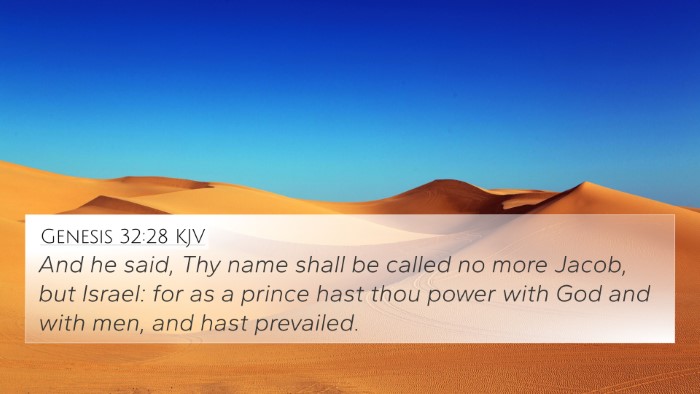Understanding 1 Samuel 26:25
Bible Verse (1 Samuel 26:25): "Then Saul said to David, 'May you be blessed, my son David! You will do great things and surely triumph.' So David went on his way, and Saul returned home."
Overview
This verse captures a significant moment between Saul and David, illustrating the complex relationship marked by rivalry, yet genuine recognition of David's potential. The scene unfolds after David spares Saul's life, emphasizing themes of mercy, acknowledgment, and future promise.
Insights from Commentaries
-
Matthew Henry's Commentary:
Henry highlights the ironic humility of Saul in this exchange, illustrating how despite being king, he recognizes the divine favor upon David. He emphasizes the contrast between their paths—David's future flourishing against Saul's decline.
-
Albert Barnes' Notes:
Barnes points out the faith expressed in Saul's blessing of David, suggesting that Saul, despite his own disobedience, acknowledges that David will succeed. This reflects a biblical motif where God’s anointed sometimes recognizes the anointed of others.
-
Adam Clarke's Commentary:
Clarke interprets Saul’s statement as a prophetic recognition of David’s future. He relates Saul's blessing to a Biblical principle of recognizing God’s choices, asserting that blessings often come from unexpected places in the narrative of Scripture.
Thematic Connections
This verse is rich with themes relevant to the study of cross-references in Scripture. It highlights:
- Mercy and Forgiveness: David’s choice to spare Saul is a profound lesson in grace and mercy (Matthew 5:7).
- Divine Favor: Saul’s recognition of David as “blessed” underscores God's choice of leaders (1 Samuel 16:12-13).
- Leadership Dynamics: The transition of power sends a message about divine appointment versus human ambition (Psalm 75:6-7).
- Prophecy and Fulfillment: Saul’s words can be seen as prophetic, foreshadowing David’s rise (2 Samuel 2:4).
Cross-References
Here are some essential cross-references that relate to 1 Samuel 26:25:
- 1 Samuel 16:13: The anointing of David as the future king.
- 1 Samuel 24:6: David’s respect for Saul’s position and anointing.
- Psalm 37:34: Encouragement to wait for the Lord and keep His way.
- 1 Chronicles 10:13-14: The account of Saul and God’s judgment upon him.
- 2 Samuel 1:20: David mourning Saul's death, showing respect despite their conflict.
- Luke 6:36: The call to be merciful as reflecting God's character.
- Romans 12:17-21: Encouragement to overcome evil with good, reflecting David’s mercy.
Final Thoughts
This passage serves as a prime example of the complexities within Biblical relationships and the understanding of God’s sovereignty. It invites readers to reflect on themes of mercy, divine calling, and the interconnectedness of Biblical narratives.
Additional Themes and Insights
By studying this verse in the context of cross-references, one can uncover the intricate patterns of God's work throughout Scripture. Engaging in a detailed cross-reference analysis can enhance spiritual understanding and provide deeper insights into God's message. It is important for readers to:
- Explore various Biblical texts that echo the themes of mercy and recognition of God’s anointed.
- Utilize tools for Bible cross-referencing, such as a Bible concordance or a Bible cross-reference guide.
- Engage in cross-referencing Bible study methods to identify parallels and connections between the Old and New Testaments.
In conclusion, 1 Samuel 26:25 is not just a historical narrative; it’s a profound reminder of the relational dynamics in the Biblical text and the foundational truths of God’s kingdom that reverberate through time.











